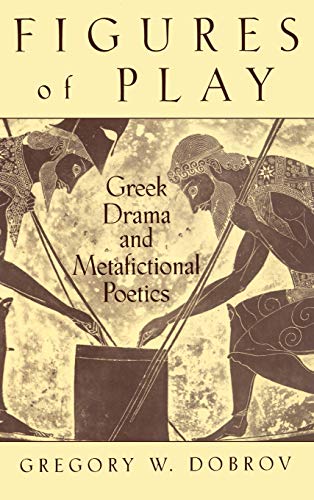Figures of Play: Greek Drama and Metafictional Poetics - Hardcover

Zu dieser ISBN ist aktuell kein Angebot verfügbar.
Alle Exemplare der Ausgabe mit dieser ISBN anzeigen:Die Inhaltsangabe kann sich auf eine andere Ausgabe dieses Titels beziehen.
„Über diesen Titel“ kann sich auf eine andere Ausgabe dieses Titels beziehen.
- VerlagOUP USA
- Erscheinungsdatum1999
- ISBN 10 0195116585
- ISBN 13 9780195116588
- EinbandTapa dura
- Anzahl der Seiten248
Versand:
EUR 3,71
Innerhalb der USA
Beste Suchergebnisse beim ZVAB
Figures of Play : Greek Drama and Metafictional Poetics
Buchbeschreibung Zustand: Used - Like New. Oxford University Press, . New York, NY, 2000. Cloth. 8vo. Book is As New. D-j is As New. Artikel-Nr. mk0009
Weitere Informationen zu diesem Verkäufer | Verkäufer kontaktieren
Figures of Play: Greek Drama and Metaphysica Poetics
Buchbeschreibung Hardcover with dust jacket. VG/VG, bumped board corners. 238 pp. Artikel-Nr. 714605
Weitere Informationen zu diesem Verkäufer | Verkäufer kontaktieren
FIGURES OF PLAY: GREEK DRAMA AND METAFICTIONAL POETICS.
Buchbeschreibung Hardback. 1st Edition. 2001. Oxford. First. Book- VG. DJ- VG. 9.5x6.5. 238pp. Artikel-Nr. 231761
Weitere Informationen zu diesem Verkäufer | Verkäufer kontaktieren
Figures of Play: Greek Drama & Metafictional Poetics.
Buchbeschreibung Zustand: Gut. 238 p. From the library of Prof. Wolfgang Haase, long-time editor of ANRW and the International Journal of the Classical Tradition (IJCT). - In perfect condition. - Content: This book is situated at the crossroads of several disciplines classical philology, dramatic theory, literary criticism and many separate lines of inquiry. It is therefore written with an eye to a wider audience outside classics. I argue that the emergence of drama in classical Athens marks the invention of sophisticated, self-aware genres in which the "play" was, fundamentally, play with already established fictions (of myth, epic, lyric, drama, etc.). This playful more precisely, metafictional temperament manifests itself in a variety of phenomenologically distinct "figures of play," whereby drama reveals and exploits an awareness of its own theatricality. Like a figure of speech, each of my "figures of play" is a unique strategy of dramatic syntax that is used to extend and complicate the signifying process; and, like figures of speech, these theatrical strategies mask a high degree of reflexivity and artifice with the pretense of innocence. Such is the theory. In practice, I take a close look at a series of plays where this more abstract "syntax" is applied to specific and familiar terms. Hence the other meaning of "figures of play," stage-figures, that is, characters in the plays chosen here as test cases for my argument: Aias, Pentheus, Bellerophontes, Tereus, and Herakles. Each of these figures acts as a focal point for the transformational poetics of the script in which he has the leading role. The mythological lineup appears to be uniform, but it conceals a generic divide, as Aias and Pentheus operate in the world of tragedy, while the latter three are comic protagonists who have been "recycled" from tragedy. This study deviates from scholarly tradition by engaging tragedy and comedy simultaneously from a single theoretical perspective. Anxiety about the strict separation of genres is as old as Plato, but it is encouraging to see a new wave of comparative work unintimidated by ancient strictures. In fact, it is fair to say that scholars currently studying the intertextual and metatheatrical aspects of Greek drama have recently established a thriving subfield with strong theoretical links to many fields outside classics. It is my hope to further encourage communication across the generic divide and between the equally formidable divides of discipline and theoretical orientation. Readers will not find here evidence of strict adherence to a single theoretical school or critical trend, though the influence of Russian formalism may be detected here and there. The uncharacteristically modern look of ancient theater in this study has less to do with theory per se than with a tradition of defining the poetics of contemporary genres against the past, with Greek drama the naive child of the European canon. I prefer to let the evidence our texts and testimonia speak for itself. However, just as native speakers of a given language will he perfectly competent without necessarily understanding the complex phonology, morphology, and syntax which they control, so the artists of the ancient Greek stage did much for which they may not have had an explicit vocabulary or conceptual framework. We, as students of antiquity, owe our contemporaries an account of our analytical framework for, if one thing should be obvious at this late point, no intellectual enterprise can honestly claim to be "theory-free." Finally, this study is an expression of love for literature that has been with me since childhood. I have felt, at times, a sort of hubristic joy in daring to formulate my own approach to material freighted with tradition and a long critical reception. For the hubris I take full credit; for the daring and good sense to try, I thank the one who taught me to read in the first place my father. ISBN 9780195116588 Sprache: Englisch Gewicht in Gramm: 491 Original hardcover with foiled dust jacket. Artikel-Nr. 1168947
Weitere Informationen zu diesem Verkäufer | Verkäufer kontaktieren

